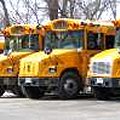- By Dan Veaner
- News
 Print
Print  The Lansing Board Of Education meeting was grim as board members considered what they will face in creating the 2011-2012 school budget over the next three or four months. At one point the budget gap was estimated at $2.3 million, but now Superintendent Stephen Grimm and Business Administrator Mary June King say they estimate it will be $1,961,329 out of a $25,168,051 budget. Reduced state aid, a bleak prospect for the district's largest taxpayer's valuation, loss of federal stimulus money, and the slow economic recovery will all contribute to a revenue gap for districts across New York State.
The Lansing Board Of Education meeting was grim as board members considered what they will face in creating the 2011-2012 school budget over the next three or four months. At one point the budget gap was estimated at $2.3 million, but now Superintendent Stephen Grimm and Business Administrator Mary June King say they estimate it will be $1,961,329 out of a $25,168,051 budget. Reduced state aid, a bleak prospect for the district's largest taxpayer's valuation, loss of federal stimulus money, and the slow economic recovery will all contribute to a revenue gap for districts across New York State. Board member David Dittman said that there it would be best to learn exactly what state and other revenues will be before setting the budget, though state schedules are not favorable for providing solid numbers to districts before they are required to have their budget ready.
"I don't think we should be looking at individual $100,000 items and saying yes or no and having people march in front of us making us a case for it," Dittman said. "There's always a case for everything. The problem is what are we going to be able to fund in a very limited educational environment. The new Governor has said we've been spending way too much on education in this state, and he plans on cutting it. So I wouldn't even look at the number we had this year."
Grimm said that is what school officials have been doing. He and Board Vice President Glenn Swanson agreed with Dittman that the role of the school board to decide whether and how to fund a budget that administrators develop with input from stakeholders in the community.
"Someone has to say we're doing it or we're not going to do it," Grimm said. "Having the people who are closest to it giving information about implications (of cuts), and then with the principals and the leadership team advising me, someone has to take responsibility. Someone has to be the one that says we are not recommending it, or we are. And that's me. It's the Superintendent's budget to the Board of Education."
Lansing Faculty Association representatives from each of the three Lansing Schools read a letter to the board asking for close cooperation and communication with board members and Grimm, and stating that LFA President Stacie Kropp speaks for a unified teacher's union.
Board members were not optimistic about revenue from AES Cayuga, a coal fired power plant and Lansing's biggest taxpayer. The company entered into a Payment In Lieu Of Taxes (PILOT) agreement with Tompkins County that would have raised school revenues, but last year it was renegotiated to downwardly value the plant. District officials, while they have no official role in the negotiation, have participated, bring their own property valuation expert Mike Coles to the table to help make sense of the numbers. School, town, and county officials are not optimistic about the current round of negotiations.
King says that AES's contribution amounted to 15.22% of the tax levy in the 2010-2011 budget. If the current PILOT remains in effect, that will be reduced to 13.99%, putting more burden on homeowners.
Grimm outlined 29 opportunities between now and the budget vote for stakeholders including teachers, department heads, administrators, students, and community members to weigh in on what is important to the district. He also noted that the newly approved strategic plan will drive the values of the district and along with data on required courses, classroom size, school population, and other elements will determine what ends up in the final budget.
Grimm said that planned use of reserves will dull the pain when it comes to cuts, but the extent of cuts in the next school year is not yet known. However Grimm said that long term planning on how reserves can be spent will make cuts a lot less painful than they could have been.
"The gap is not a canyon when you use reserves," he said.
But he also said that after a state mandated building inspection the district will need to average about $2 million in capital improvements and repairs per year.
Swanson said there are limited things the board can do when developing the budget. He said the board can increase taxes, cut spending, use reserves, and/or use the appropriated fund balance.
"The unfortunate part is that it looks like we're going to have a reduction in our revenue stream," Swanson said. "That means we're going to have to make some tough choices that people aren't going to like. None of us are going to like them. We can understand it intellectually, but it's difficult when it comes down to certain people or certain jobs."
v7i2



